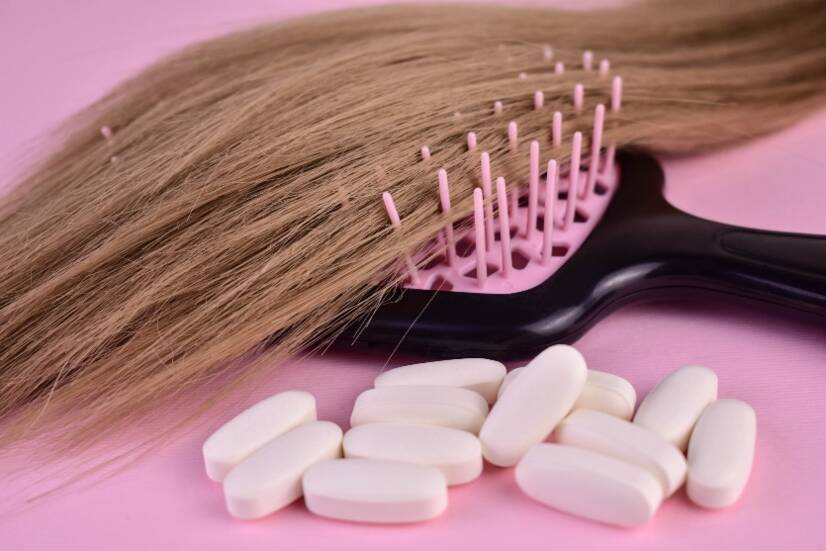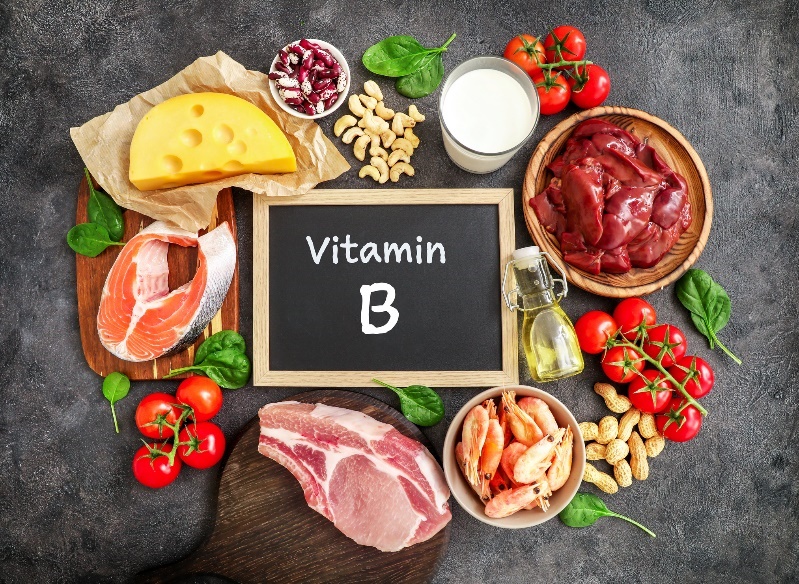- KUKLOVÁ, Ivana, HERLE, Petr, ed. Dermatovenerology for general practitioners. Prague: Raabe, c2011. ISBN 978-80-87553-28-2
- solen.sk - News in the treatment of alopecia. Solen. MUDr. Hana Duchková, DrSc., MUDr. Marta Hašková
- solen.cz - Diagnosis and treatment of the most common hair diseases. Solen. Helena Michalíková, M.D.
- healthline.com - Hair Vitamins: What Are They, and Do They Work? Healthline. Amy Richter, RD
- medicalnewstoday.com - Which nutritional supplements are best for treating hair loss? Medical News Today. Alexandra Sanfins, Ph.D.
Dietary supplements for hair: what should they contain? Are they effective?

Many people, especially women, desire long and thick hair. Genetics, health, lifestyle and grooming all play a role in this. Today, the market offers a large number of dietary supplements to promote hair growth. What should a supplement contain? Are vitamins for hair really effective?
Article content
Dietary supplements for hair and their effect and content + foods for healthy hair. Let's not forget about an overall healthy lifestyle...
The density and quality of hair is mainly influenced by physical and mental state, hormonal balance and genetic factors. However, the condition of hair can be influenced by an appropriate lifestyle, diet and possibly help yourself with dietary supplements.
You can learn about suitable hair vitamins, minerals, herbs and herbal remedies, the advantages and disadvantages of dietary supplements, foods for healthy hair and many other interesting information in the following article.
The effectiveness of dietary supplements on hair
Unlike cosmetic products, dietary supplements have the advantage of nourishing the hair from the inside. Taking care of the hair from the outside is very important for its quality, but sometimes it may not be enough for real growth.
However, hair growth and quality are also affected by factors over which even dietary supplements may not have power. These are mainly genetic factors, autoimmune, hormonal or skin diseases.
Mental state is also an important factor. Stress is a trigger for many diseases and disorders, including hair loss.
The aim of a dietary supplement for hair is to replenish the necessary nutrients. However, nutrients should be taken primarily from a complete diet.
A balanced complete diet will supply the body with all the necessary proteins, vitamins and minerals for hair. If you are not getting enough of the necessary nutrients in your diet on a regular basis, it is advisable to reach for a dietary supplement.
The advantage of a good quality dietary supplement is its comprehensiveness, containing all the important substances for hair. Complex products contain vitamins, minerals, herbal or natural ingredients and often also amino acids or proteins.
A dietary supplement is an aid to the desired hair. However, it does not form the basis of success. This is physical and mental health, diet, lifestyle and hair care.
The disadvantage is often the high price, which does not always correspond to the composition. It is therefore important to pay attention to the quality content of the active ingredients of the dietary supplement.
What should a dietary supplement for hair contain?
There is a wide range of dietary supplements on the market to choose from, whether in the form of capsules, tablets, gummy candies or powder to pour over liquid.
Most products on the market contain groups of vitamins and minerals aimed at nourishing the hair. More comprehensive products also contain extracts of certain herbs and plants that promote hair growth and quality.
Collagen or keratin proteins and other active ingredients(hyaluronic acid) can also be found in some dietary supplements.
What is important in a hair complex and what is not necessary?
Vitamins
Vitamin A supports the scalp and the physiological production of sebum. It nourishes the hair roots and prevents hair loss. It helps prevent brittleness and dryness of the hair.
The essential "hair" vitamins include the B vitamins (B-complex). Niacin, vitamin B3, nourishes the scalp and promotes hair quality.
Vitamin B6 has a positive effect on the blood supply to the scalp. This leads to greater blood supply to the scalp and also to greater oxygen and nutrient supply to the hair follicles. Vitamin B12 in turn prevents hair loss.
Biotin (vitamin B7) and pantothenic acid are used to treat hair loss. Biotin promotes the growth of new hair and strengthens the structure of already grown hair and nails.
In addition to the immune system, vitamin C supports hair health. It is essential for the synthesis of collagen and keratin, which are necessary for strength and healthy hair growth.
Vitamin D promotes skin health and the formation of hair follicles. Vitamin D plays an important role in calcium homeostasis, the immune system and cell growth. Vitamin D deficiency is often associated with a condition called alopecia.
Vitamin E supplementation is also recommended, as it has beneficial effects on the scalp, hair growth and skin.
Vitamins: their effects, symptoms of excess and deficiency, sources
Minerals
Zinc is a key element for the physiological cycle of hair growth. In order for new hair to form in the hair follicles, be strong and not fall out, it is necessary to supply the body with enough zinc. It has a beneficial effect on the overall quality of the nails and skin.
Selenium is a mineral that, as an antioxidant, provides the body with many benefits in preventing and fighting disease. It is also essential for the physiological growth of hair, nails, wound healing and helps against premature cell aging.
Iron helps oxygenate cells. It is thus an essential mineral for proper body function, including hair growth. Its companion vitamin C is important for its absorption.
Calcium is also an important mineral for healthy hair growth and healthy hair follicles. If calcium levels in the body are low, hair loss can also occur.
The trace element silicon plays an important role in combating hair breakage and weakness. It strengthens and benefits hair, nails, skin and tooth enamel.
Minerals: their effects, symptoms of deficiency, excess and sources
Herbal and natural components
When choosing products to promote hair growth, it is advisable to consider herbal natural ingredients in addition to vitamins and minerals.
Extracts of nettle, horsetail, brewer's yeast, aloe vera, bamboo, green tea, coconut water and others are suitable.
Nettle and horsetail herbs contain silicon, which strengthens hair and nails. It reduces excessive hair loss, promotes hair quality and hair growth itself.
Aloe vera is a plant packed with nutrients. It is especially good for unnourished hair affected by dandruff. Bamboo extract contains large amounts of silicon, strengthens the hair structure and adds shine.
Proteins and amino acids
The basic component of hair is a protein called keratin. This is obtained by the body through a balanced diet with plenty of protein.
If our diet lacks protein, our hair is often dry and weak.
The essential amino acids L-methionine and L-cysteine are useful. They are important components of the protein keratin and are involved in its formation (synthesis).
Keratin, collagen or any other protein should be broken down in the digestive tract after consumption into amino acids, which then form new proteins.
Thus, the effect of keratin and collagen in a dietary supplement may be directed not only at the hair, but especially at other, more important structures of the body. In any case, however, they are beneficial in terms of protein intake.
Foods for healthy hair
Protein is essential for hair health. Protein is an essential building block of our bodies, and not only of our hair. Human hair is composed mainly of protein, and therefore its intake in our diet is extremely important.
Without enough protein, hair will be weak and brittle with a tendency to fall out.
It is advisable to include both animal and vegetable proteins in your diet. These include fish, chicken, eggs, quinoa, chickpeas, spinach, broccoli and others.
A deficiency of B-complex can cause hair loss and reduced hair quality. It is found in foods such as nuts, leafy greens, beef, seafood, legumes (beans), avocados and others.
Zinc and iron are also found in legumes (beans, lentils), lean beef, eggs, spinach and nuts and seeds.
It is important to moisturise the hair and skin not only from the outside but especially from the inside. Adequate and regular drinking of clean water is essential.

A dietary supplement will not help with poor diet and care
A person grows approximately 1 to 1.5 cm of new hair per month. This is an average of 12 to 15 cm of hair per year.
Good quality comprehensive hair vitamins are a good help to achieve the desired goal. However, without proper lifestyle and care, dietary supplements will not have the desired effect.
Physical and mental health is key: a strong immune system, hormonal balance, elimination of chronic stress, professional treatment of possible diseases, quality sleep, regeneration of the body, etc.
Hair quality is also related to external care. Limiting heat treatments, appropriate cosmetic products, regular hair nutrition and gentle scalp care will help.
Interesting resources
Related










